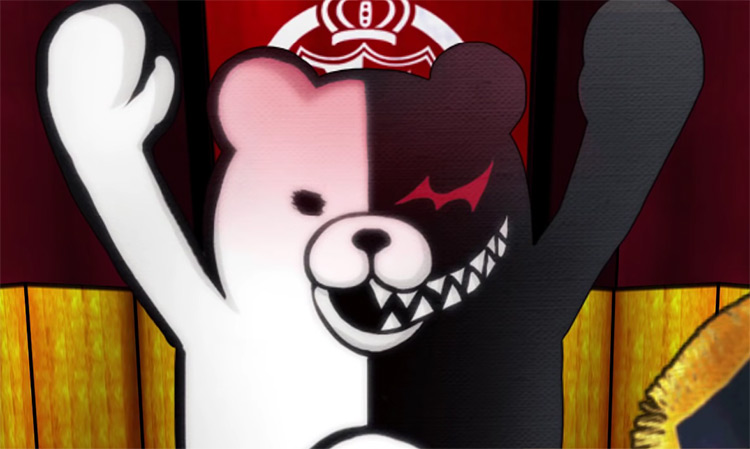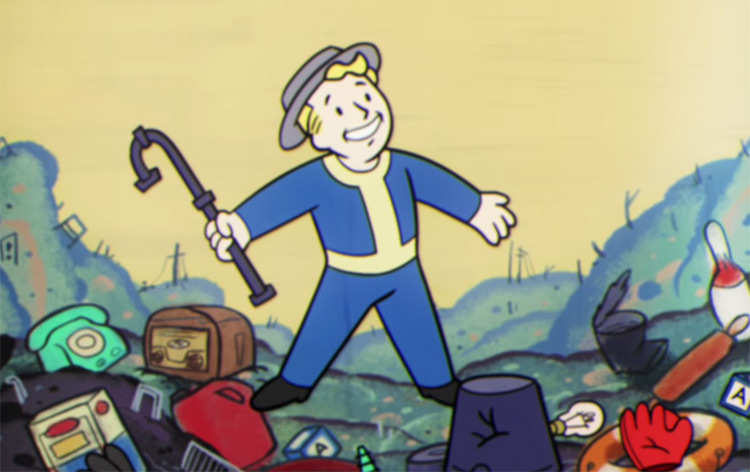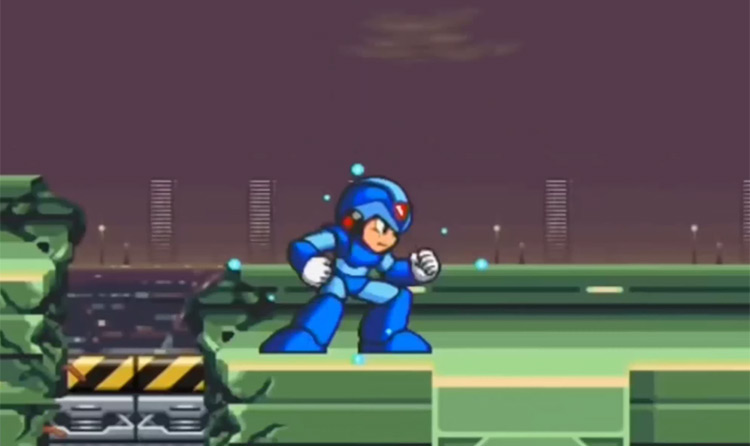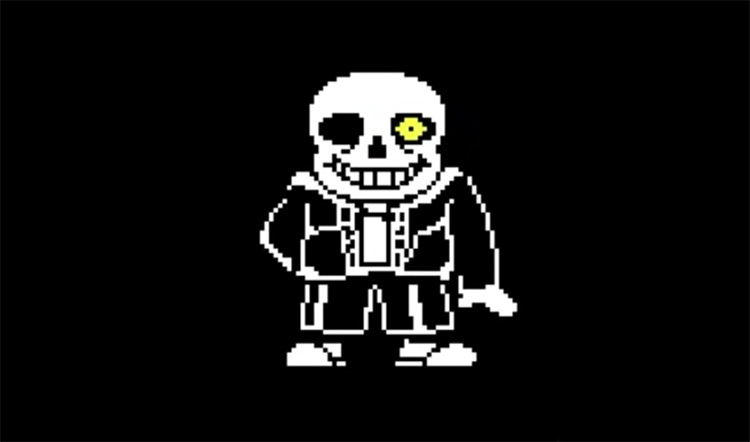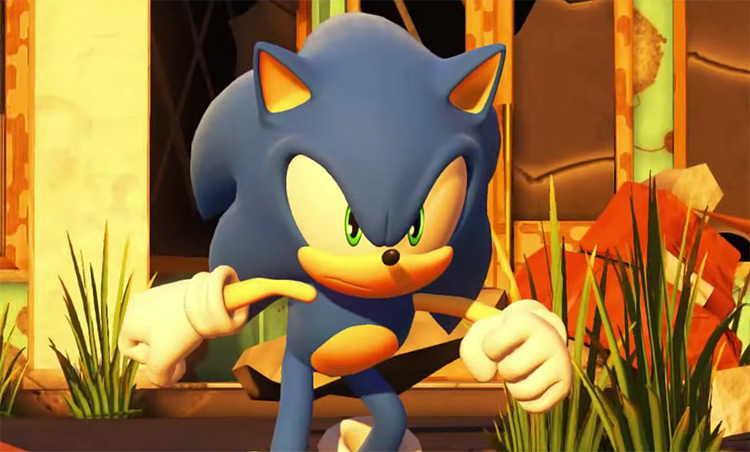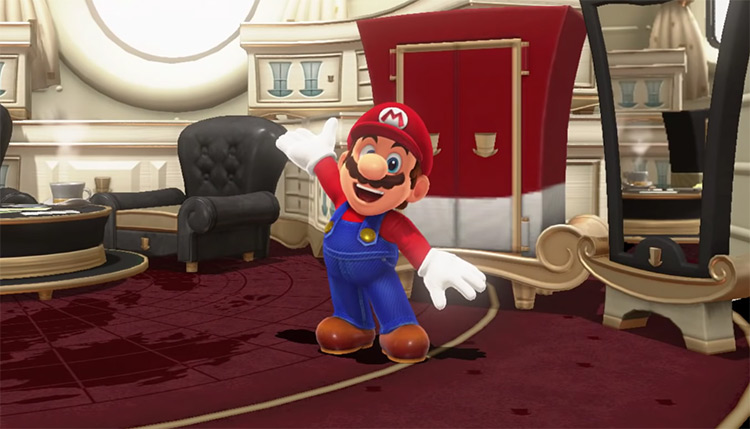These eye-catching and memorable characters have been a crucial part of marketing since the mid-19th century. Icons like the Quaker Oats man or the controversial Aunt Jemima were essential in building their respective product brands. Since video games generally need a character for the player to control, they naturally gravitated toward the practice, starting with Pac-Man in 1980. With time, mascots have become part of gaming culture. They’re the symbols of our childhoods, and they shared our brightest moments. They may not be “real”, but the love we feel for them sure is.
15. Monokuma
First appearance: Danganronpa: Trigger Happy Havoc (2010) Meeting an adorable mascot in a video game is usually cause for celebration. After all, mascots are supposed to bring good luck… except for Monokuma. Initially a disguise used by the Despair Sisters, this robotic teddy bear has returned in one way or another in almost every game in the series – usually as the Mastermind’s front. Its design, which splits its body into a “good” and a “bad” side, reflects what Monokuma is all about. It’s a creature of contradictions – half hopeful white bear, half blackened despair. The rising popularity of Danganronpa has brought Monokuma into the spotlight. Their dark/emo design made Monokuma merch a staple of streamers and e-girls worldwide.
14. Ludens
First appearance: Kojima Productions logo movie (2016) Fans of Metal Gear Solid and rockstar game developer Hideo Kojima will recognize Ludens – Kojima Productions’ mascot. Kojima based Ludens’ design on the idea of the Homo Ludens – the “playing man”. Sure, smarts brought society where it is today, but the importance of play on developing the mind and sparking our creativity cannot be overstated. Video games offer a unique opportunity to take “playing” to new horizons. Illustrator Yoji Shinkawa drew Ludens as an astronaut because they’re at the vanguard of exploration – with Kojima Productions’ flag in hand.
13. Chocobo
First appearance: Final Fantasy II (1988) What JRPG fan doesn’t love Chocobos? These adorable yellow birds are the horses of the Final Fantasy multiverse. Politics, technological development, and even magic rules can change from one entry to the next – but Chocobos are always there. They’re beasts of burden that look like a giant baby chick, though games like FFXIII and FFXV give them a dashing face and sharp claws to make them just a little bit less silly. A Chocobo has always seemed like the perfect pet to me. I’m crossing my fingers and hoping that science gets far enough to make them a reality in my lifetime.
12. Vault Boy
First appearance: Fallout (1997) A good mascot can make even the most dangerous things seem harmless – and the Vault Boy is a prime example. This jumpsuit-clad man is the only mascot left after Fallout’s apocalyptic nuclear war. He’s the face of Vault-Tec, and since they were basically the only ones making nuclear apocalypse-proof items before the bombs fell in 2077, he’s still a common sight in the Wasteland. His happy-go-lucky design (based on Rich Uncle Pennybags from Monopoly) creates a stark contrast with the post-apocalyptic doom and gloom. Finding a Vault Boy bobblehead in an abandoned, ghoul-infested vault is one of those little moments of absurdity that make Fallout such a great game.
11. Crash Bandicoot
First appearance: Crash Bandicoot (1996) Crash Bandicoot was one of the biggest gaming sensations of the 90s. His wacky personality was a hit with children and teens who adored Crash’s rebellious streak. Bandicoots are cute but relatively unknown animals, making them very memorable and the perfect face for the Playstation brand at the time. Hell, some people even think bandicoots are a fictional species. Not so!
10. Bomberman
First appearance: Bomberman (1985) If we dial back the clock around ten more years, we’ll find Bomberman – one of the longest-lived and most ubiquitous mascots of video game history. Konami’s white bomber may not be super popular nowadays, but a steady supply of new Bomberman games every couple of years keeps the mascot relevant. No kid is gonna plaster their walls with Bomberman posters – but when they see the guy on a game cover, they know what it’s all about.
9. Klonoa
First appearance: Klonoa: Door to Phantomile (1997) Ok, I know what you’re thinking: “Who cares about Klonoa in the 2020s?” Well, I do! I love this cat-bunny-dog thing, with his long ears and earnest personality. I was a pretty quiet and meek kid back in the day, and obnoxious mascots like Crash Bandicoot or headstrong ones like Spyro just weren’t relatable for me. On the other hand, Klonoa’s calm demeanor and endless efforts to protect people’s dreams were comforting and inspiring at the same time.
8. Mega Man
First appearance: Mega Man (1987) Mega Man has long since seen his best days, but our love for the blue bomber continues to burn deep in our hearts. Mega Man was the protagonist of many of the best gaming experiences of the late 80s, 90s, and early 2000s. Jumping and shooting became synonym with gaming for a while, and kids’ notebooks were full of doodles of Mega, Dr. Willy, and his corrupt robot underlings. Regrettably, Capcom hasn’t done anything worthwhile with the character in over 10 years, but we keep our hopes up for the future.
7. Sans
First appearance: Undertale (2015) Sans wasn’t meant to become Undertale’s mascot at the time of release. After all, we already had Flowey – a “friendly” flower that “teaches” you the basics of combat. That said, there was something about Sans that really resonated with the audience. He doesn’t look like much when you first meet him, but you can tell they’re hiding something – and finding out what is one of the game’s most pivotal moments. This, along with his fantastic boss battle theme “Megalovania,” made Sans’ Undertale’s de-facto mascot.
6. Sonic the Hedgehog
First appearance: Sonic the Hedgehog (1991) The OG Blue Blur is undeniably one of the best and most popular gaming mascots of all time, standing proud among heavy hitters like Mario and Pikachu. Sonic was first designed to be cute and cool at the same time. His original rounded, big-bellied look was adorable and easy to draw, making it stick to kids’ minds like hot glue. The character kept evolving with time, adopting a sleek and cool heroic look in 2000s games like Sonic Adventure 2: Battle and Sonic Heroes. This was the Sonic I got hooked on, becoming a lifelong fan. SEGA’s apparent inability to make a good sonic game keeps the hedgehog from a higher spot on our ranking. They’ve tried many new concepts, but continue to fail at capturing what makes Sonic good.
5. Master Chief
First appearance: Halo: Combat Evolved (2001) The XBOX arrived in 2001 to shake up the gaming world by appealing to older audiences who’d had enough of children’s games and cutesy mascots. Leading the charge was Master Chief, who became the face of the Xbox brand and Microsoft Game Studios as a whole. Rather than a friendly bright-colored anthropomorphic animal, the Chief is an alloy-clad super-soldier who just won’t take no for an answer. No matter the scale of the conflict, this Spartan will push through with grit and bad-assery. That, and good luck.
4. Kirby
First appearance: Kirby’s Dreamland (1992) Kirby is one of Nintendo’s most iconic characters, appealing to every demographic old enough to hold a controller. The thing with Kirby is that, like his jiggly pink body, he’s flexible. He’s adorable but also a total bad-ass – especially with the right copied ability. Despite being quite literally a pink marshmallow, this dude fights primordial forces of evil, corrupt monarchs, giant metal birds, and everything in-between (and wins). Plus, he’s one of the OG members of the Super Smash Bros. roster. That’s a badge of honor like no other!
3. Kratos
First appearance: God of War (2005) I find Kratos’ evolution from rage-driven mass murderer to hard-working dad trying to raise his son one of the greatest stories ever told in the medium. It reflects our changing perception of what gaming is supposed to be, and the changing values of an aging gaming demographic seeking titles that speak to their adult experiences. Kratos used to be all about vengeful violence, going so far as to destroy the Greek pantheon. While dismemberment and disemboweling are still vital aspects of his life in the Norse realm, his reasons for exerting violence are entirely different – just as our reasons for playing have shifted over the years.
2. Mario
First appearance: Donkey Kong (1981) It’s a-him, Mario! If you’d told anyone back in the early 80s that an Italian plumber created by a Japanese gaming company would become one of the biggest pop culture icons in history, they’d have thrown you in an asylum. Mario is quite literally the face of gaming worldwide. Even in the most remote regions of the world, people recognize the big red M on his cap. Hell, my mom still refers to enjoying video games as “playing Mario Bros.” even when she knows full well the game I’m playing has nothing to do with the 1983 arcade classic.
1. Pikachu
First appearance: Pokémon Red & Blue (1996) Mario may be Mr. Video Games, but no mascot in history has been as widely loved and celebrated as Pikachu – the chubby Electric-type that captured the hearts of a generation. Known as the Mouse Pokémon, this static-charged rodent is the face of the Pokémon franchise. Not only was it in Super Smash Bros. since the beginning, but the appearance of Ash’s Pikachu in the Pokémon anime really catapulted the yellow critter to stardom. I love every mascot in this ranking, but none of them make me go “pika-pika” like Pikachu.
